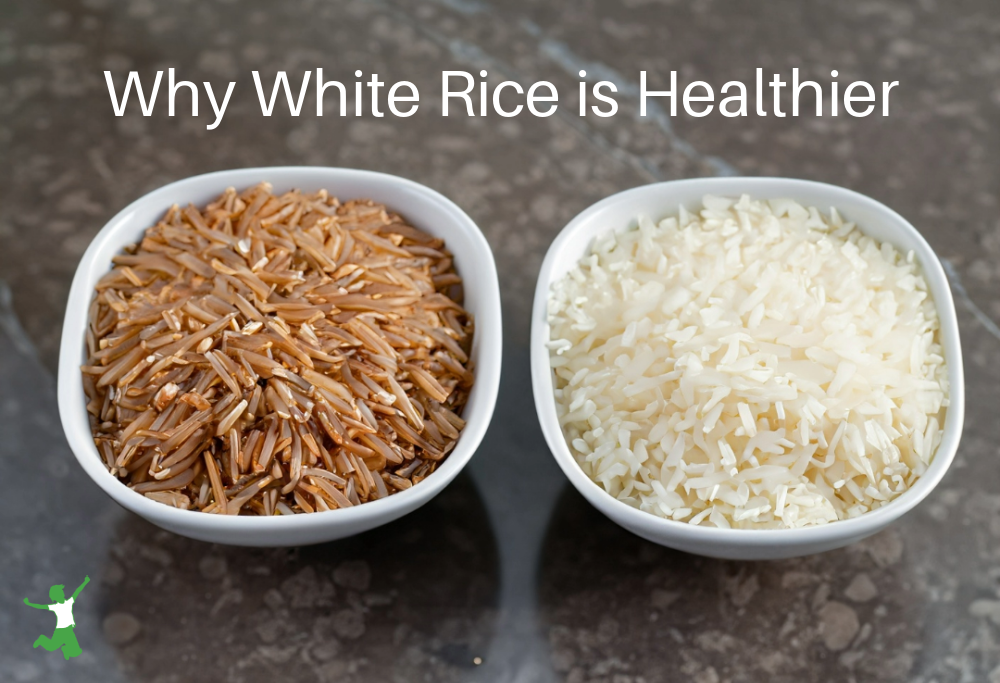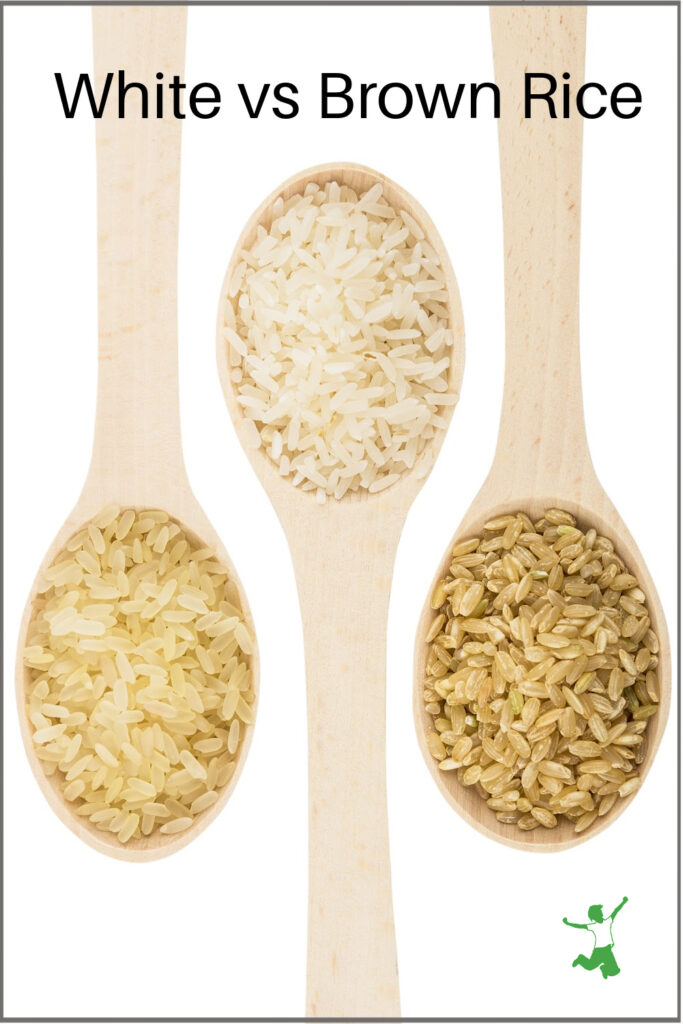The reasons white rice is healthier than brown rice as determined by research as well as which type traditional societies preferred consuming.

My article and video on healthy Chinese food drew some comments from readers who questioned my choice of rice.
Why was I using white rice vs brown? Isn’t brown rice the healthier choice, after all?
Ok, I’ll spill the beans, rice. Here are my reasons …
The truth is, neither my husband nor myself have ever enjoyed brown rice (although we love the nutty flavor and digestibility of wild rice).
Every time we eat brown, it just seems to not sit very well in our stomachs.
Even when it is sprouted or soaked before cooking, it, well, uh, sits like a brick for lack of a better word.
Why Some People Should Eat White Rice
White rice just seems to digest a whole lot better for us. That to me was reason enough to choose it over the brown rice.
We were also advised by an Ayurvedic MD back in the 1990s to stick with white basmati rice. This recommendation clinched the decision.
You are what you digest, after all – not necessarily what you eat!
End of story? Well, not quite.
Rice Fiber in Brown Harms a Compromised Gut
A few years back at the annual Wise Traditions Conference, I became familiar with a compelling book called Fiber Menace.
The author writes extensively about the dangers of a high-fiber diet as it pertains to a menu loaded with whole grains as pushed by the misguided Food Pyramid.
In other words, folks who eat a bowl of All Bran every morning to keep the bathroom visits regular are unknowingly ripping their insides to shreds.
The basic premise of Fiber Menace is that grain fiber plays a leading role in many gut-related ailments including colon cancer.
When I first learned of this information, my preference for white rice over brown rice started to make more sense.
Perhaps the brown rice didn’t digest that well because of all that fiber?
Chalk one up for the white rice.
White Rice Far Lower in Phytic Acid
A second piece of information came from author Ramiel Nagel.
In his book, Cure Tooth Decay, he writes about the devastating effects of phytic acid in the diet. Phytic acid is a very powerful antinutrient and blocker of mineral absorption in the gut.
Mr. Nagel identifies brown rice as very high in phytic acid.
What’s more, soaking brown rice does not reduce phytic acid by much at all!
Polished Rice is the Ancestral Form
Ramiel also maintains that the traditional method for preparing brown rice is never to eat it whole (with only the husk removed).
Rather, ancestral societies pounded brown rice in a mortar and pestle to polish it by removing the outer bran layer. This is the primary source of the phytic acid.
Nagel goes on to point out that experiments have shown that the milled and polished rice that results from this pounding process, has the highest mineral absorption.
In short, mineral absorption from whole brown rice is much less than white polished rice. This is because the phytic acid in the bran which is not reduced much by soaking, greatly interferes with the absorption process.
What About Arsenic?
A big issue with arsenic contamination in rice has emerged in recent years. Some folks have responded by no longer eating rice at all.
This is an overreaction, in my view.
Clean rice is definitely available if you know what to look for.
This article on how to avoid arsenic in rice details what to do. While soaking brown rice barely moves the needle on phytic acid, soaking white rice before cooking removes nearly all the arsenic!
Another option is to parboil white rice before using fresh water for a full cook if you don’t have time to soak.
Is White Rice Better Than Brown?
So it seems that brown rice is not necessarily a healthier choice than milled white rice.
Black or red rice would fall into the same category.
Obviously, whether you choose one or the other is a personal preference, but I hope this information helps you sort through the decision with a bit more clarity.
As for me and my family, we will be sticking with white basmati and jasmine rice (white basmati rice is more nutritious than plain white rice).
I currently buy this brand of rice in 25-pound bags as the most economical and high-quality choice.
Observation clued me in many years ago that brown rice was not something that was sitting well in my stomach or my husband’s.
As the years go by, more research is coming forth to indicate that this decision was the right way to go after all.
Do you eat white rice or brown rice in your home? Why or why not?

References
(1) Fiber Menace
(2) Living with Phytic Acid
More Information
Macrobiotic Diet and Extreme Vitamin D Deficiency
Tiny Teff Grains Deliver Big on Nutrition
How to Make Perfect Yellow Rice (Arroz Amarillo)
Millet: Healthy or Not?
Do Whole Grains Cause Cavities?








I came across this article in my search to find the healthiest rice (brown basmati rice). What I find interesting is it seems that all those individuals whose bodies do not tolerate brown rice very well making the switch to white rice and basing there descisons on the two articles referenced (Fiber Menace and phytic acid). I did not hear anyone that loved brown rice and experienced no gastic discomfort switching to white rice. Just a observation. I also am curious as to how much is considered too much high fiber. Are they talking about more than the 25-35 grams of fiber required for men and women? Thanks for giving us things to think about.
Thank you for this article! I was trying to find an Ayurvedic teacher whom I had seen on Dr. Oz who disagreed with Dr. Oz and preferred white rice over brown. I am glad to hear that their are other’s who trust their own bodies over general advice. I have always had digestive issues and find white rice much easier to digest as well. No more guilt for eating white rice!
Right on, Teresa!!!!
I’ve read the article and comments with interest. Years ago, I practiced as a nurse on a remote island in the Pacific where white rice was the only rice folks could get, and white flour was the only flour they had access to. The rampant, raging cases of diabetes was pathetic. As folks adjusted their diet by adding more fiber (grain fiber and all), among other lifestyle changes, their blood sugars dropped quickly into normal ranges.
I am not convinced by some of the “evidence” that I’ve read in this article and other posts that grain fiber is a culprit for any problems. Folks like the quick “chew” of white rice, and preference often ends up outweighing other more substantial evidence.
If you have intestinal problems when adding fiber, whether rice or other whole grains, start out mixing the whole grains with the white half and half, then graduate up until your system has adjusted to the natural food. Initial problems are not a sign that the food is bad, but that your body is not used to the function of the fiber.
A plug for fiber:
1) Fiber binds with cholesterol in the bowels, thus reducing blood cholesterol.
2) Fiber in the bowels absorbs much needed water, keeping the bowels functioning well. Sluggish bowels mean that toxins and other impurities stay in the gut longer, allowing them to be absorbed back into the body.
3) Fiber is the “slow release” mechanism needed by the grain to release the sugars into your blood stream at a steady rate.
One final note: When I grew up in Arkansas where they grew a lot of rice, we purchased the rice bran/germ millings from the grain mills for a wonderfully low price. We added it to our horses’ grain and they developed the most luxuriously silky coats and manes. Frankly, I would like those nutrients, thank you!!
Thank you for your input on this conversation! I love hearing about the horses coats!
What peer-reviewed scientific journals have studies published on the health risks of consuming brown rice vs. white rice? What peer-reviewed scientific journals have studies published that support the information in the book, The Fiber Menace?
Have you done any background research on the author of this book who is, not an M.D. but a “pharmacist” educated at a “reputable university” (name of said university never shared). Tell me, what respectable medical researcher doesn’t even give a clue to where they were educated? Did you ask yourself while reading this book if maybe the author is trying to sell you something? While science cannot always answer our questions, and isn’t a perfect method in finding truth, it is the best and most sound method available. Please be discerning here; some guy claiming to be a medical professional publishes some whack book going against decades of research regarding refined vs. whole grains is probably trying to sell you something. Look into this “author’s” background. Read *real* research – and certainly do that before you share with others – in the name of avoiding the spread of misinformation.
I’m starting to understand more about the phytic acid, but can someone please tell me about lectins? Aren’t these of concern in the diet too? What do I soak beans in and how if we were to eat them and would we even need to soak rice if it is the Basmati white? I also read lately about how cooked meats have been found to have carcinogens that only happen when heated that cause cancer. We eat grass-fed and pastured meats often. We have been staying away from most all beans and grains but just started incorporating sprouted Ezekiel Bread and I also found some sprouted blue corn chips, with other grains by Garden of Eatin’. I really would appreciate input on these subjects since I don’t have time with a newborn and 20 month old to dig around blogger websites right now. Thank you in advance!!
Chinese people actually ate only whole grains for thousands of years. It apparently wasn’t until the late 1600s that people started eating white rice in greater numbers. White rice constipates, is devoid of valuable minerals, vitamins, and fiber…it’s empty calories. Brown rice, and especially sprouted brown rice (GABA rice) is loaded with all kinds of valuable nutrients. The Chinese government is actually trying to get 15% of all rice consumption switched to sprouted brown rice by 2015 both for nutritional/health advantage and also because this could feed more people with an equivalent harvest of rice since the bran is not thrown out…
I seem to be just about the only one here who prefers brown rice to white! I find the white to be rather insipid in both flavor and texture.
Then again I’m sure jasmine or basmati would help. Thanks, this was good food for thought.